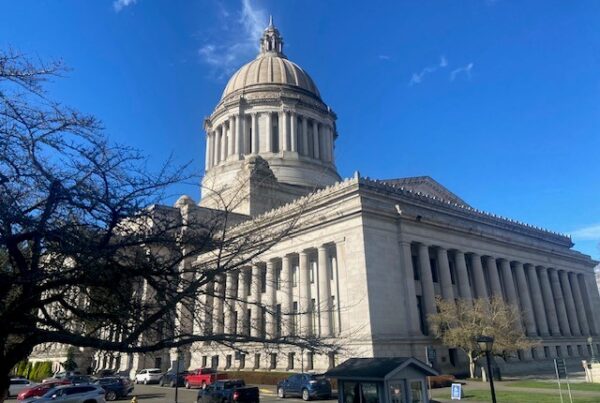
By Aaron Czyzewski
Director, Advocacy & Public Policy
Photo: JamesInOregon – Creative Commons License
At the time of writing, this is the 73rd day of the 105-day 2023 Washington State Legislative Session.
What follows is an update on Food Lifeline’s 2023 Advocacy Agenda and our priorities that are currently in motion. On balance, the process has been kind in some respects, cruel in others. Some bills have been scaled back, but continue to move. Remaining questions surround new progressive revenue like a proposed wealth tax and changes to the estate tax to close loopholes and reduce regressivity.
Our advocacy priorities stem from Food Lifeline’s Public Policy Platform and are designed to support our mission which is to abolish the root causes of hunger and strengthen our public safety net. In our nation hunger, poverty, and racism are intertwined, the success of this mission is dependent on our ability to operate as an anti-racist organization that advances racial equity and social justice.
For context on food insecurity in Washington: WAFOOD4 Survey Report here.
EQUITY & SOCIAL JUSTICE
Enhancing the Washington Voting Rights Act – HB 1048, Representative Sharlett Mena. The bill is moving – on March 4, passed the House by a vote of 57 yeas, 38 nays, 3 excused. In the Senate, it is scheduled for a vote in the State Government & Elections Committee on March 24. This bill lowers barriers for communities to access the promise of the Washington Voting Rights Act – a violation of the Act is established when elections exhibit polarized voting and there is a significant risk that members of a protected class do not have an equal opportunity to elect candidates of choice because of dilution or abridgement of their rights.
Lived Experience aka Nothing About Us Without Us Act – HB 1541, Representative Darya Farivar. An act relating to increasing access and representation in policy-making processes for people with direct lived experience on Boards and Commissions. The bill is moving – on March 7, the House passed the bill by a vote of 83 yeas, 12 nays, 3 excused. In the Senate, it is scheduled for a vote in the State Government & Elections Committee on March 24. The bill implements certain membership requirements for statutory entities, defined as any multimember task force, work group, or advisory committee, that is: (1) temporarily established by statute for the specific purpose of examining a particular issue that directly and tangibly affects a particular underrepresented population, and (2) required to report to the Legislature on that issue. Requires various reports by statutory entities and the Office of Equity on the effectiveness of the membership requirements under the act, among other information.
Access to Fairness Act – HB 1025, Representative My-Lihn Thai. This bill died. It was passed in its committee stops but not pulled for a floor vote in the House. Had it passed, statue would be in place to create a private right of civil action for harm from violations of the state Constitution or state law by peace officers without the federal shield of “qualified immunity.” This provision is necessary to encourage accountability, training, and better supervision, recognizing that police are not above the law. Under HB 1025, individual officers are not liable, they are indemnified by their departments.
Independent Prosecutor for Police Use of Deadly Force – 2SHB 1579, Representative Monica Stonier. This bill is moving. On March 4, the House voted to pass this bill by a vote of passed; 52 yeas, 44 nays, 2 excused. In the Senate, the bill is scheduled to be voted on by the Senate Committee on Law & Justice on March 22. This bill would provide for an independent prosecutor, to complement the work of the new Office of Independent Investigations, to handle these charging decisions and any prosecution to ensure fair, credible, and transparent prosecutions.
Attorney General Investigations and Reform – HB 1445, Representative Drew Hansen. This bill died awaiting to be scheduled for a floor vote in the House. If passed, it would have strengthened and clarified the Washington Attorney General’s authority to investigate and bring suits where systemic failures at a local agency or department result in violations of Washington State Constitution or state law.
Traffic Safety for All – HB 1513, Representative Chipalo Street. This bill died. It would end police stops for non-moving violations to allow law enforcement to focus on high-risk stops such as impaired, distracted, and reckless driving. This would reduce disproportionate impacts on communities of color and end interactions that too often escalate to violence.
POVERTY
Guaranteed Basic Income Pilot – HB 1045, Representative Liz Berry. This bill would create the Evergreen Basic Income Pilot Program. The bill had a public hearing but died in committee. The pilot program would have established a monthly, flexible cash payment for households that meet certain eligibility requirements that can provide a vital economic cushion. The proposed expanded pilot program would have offered access to cash payments in nine different regions and incentivize data collection to determine the feasibility of a statewide program.
TANF – Strengthening the ability of assistance programs to meet foundational needs of children, adults, and families – HB 1447, Representative Strom Peterson. This bill is moving. It passed the House by a vote of 58 yeas, 38 nays, 2 excused. In the Senate, the bill has been scaled back and is scheduled for public hearing in the Senate Committee on Ways & Means on March 23. The Temporary Assistance for Needy Families Program is a federally funded program that provides cash assistance to parents or caregivers with children, and pregnant individuals in deep poverty. HB 1447 would restore pre-2011 policy and allow families to access help when they and eliminate time limits for child-only cases. It would expand asset limits for cash assistance programs up to $25K and waive the value of one car. It also would facilitate a path off TANF by allowing families to earn more (increasing the income limit to 200% FPL), consistent with other benefits programs and smooth the cliff effect by disregarding 6 months of gross income. It gives families time to stabilize, without losing benefits by introducing Stabilization Waivers for families by allowing hardship as a “good cause” exemption from WorkFirst requirements.
Stability for People with a Work-Limiting Disability or Incapacity – HB 1260, Representative Emily Alvarado. This bill is moving. It passed the House by a vote of 92 yeas, 4 nays, 2 excused. In the Senate, the bill is scheduled for public hearing in the Senate Committee on Ways & Means on March 23. It would stop requiring low-income disabled people to pay back Aged, Blind and Disabled benefits after they qualify for federal benefits.
Housing – Protecting tenants by prohibiting predatory residential rent practices and by applying the consumer protection act to the residential landlord-tenant act and the manufactured/mobile home landlord-tenant act – HB 1388, Representative Nicole Macri. This bill died in committee after a public hearing on February 9.
Related affordable housing and homelessness priorities awaiting action in the operating and capital budgets:
- The Governor’s proposal to provide $4 billion for affordable homes. And at least a $400 million investment in the Housing Trust Fund in this year’s capital budget.
- Prevent an immediate loss of homelessness funding by filling the up to $160 million gap in document recording fee revenue that funds homelessness services across the state.
- Invest $40 million to increase contracts for housing and homelessness service providers to address the workforce crisis.
- Prevent evictions by investing in the Right to Counsel program ($4.4 million) for tenants in eviction court and early intervention civil legal aid for tenants at risk of eviction, but not yet eligible for Right to Counsel ($5 million).
- Increase the Governor’s permanent investment in the Housing and Essential Needs rental assistance program by an additional $11.5 million to a total ongoing increase of $26.5 million to prevent cuts from the current (Fiscal Year 21-23) funding level.
NUTRITION ASSISTANCE
Free school meals, E2SHB 1238, Representative Marcus Riccelli & SB 5339 Senator T’wina Nobles. Although vastly scaled back, the House bill is moving and on March 2, was passed by the House (93 yeas, 3 nays, 2 excused). In the Senate, it is currently referred to the Ways & Means Committee to be scheduled for a public hearing. Summary: Requires school districts to provide breakfast and lunch without charge to any requesting students at public schools serving any of the grades of kindergarten through grade 4 with 30% or more of their students eligible for free or reduced-price meals. Phases in meal provision requirements over two years, beginning in the 2023-24 school year in schools with 40 percent or more of their students eligible for free or reduced-price meals. In this first year, 116 new schools would serve universal free meals to approximately 44,000 students. In later years, 46,000 additional students would receive free meals from 104 new schools. In total, 634,000 students would receive free meals, over half of the 1.1 million total population of schoolchildren in Washington at a cost of $55 million over 4 years.
Funding for Food Banks, Senior Meals… (Early Action Supplemental Budget Request), HB 1784, Representative Mia Gregerson. The bill is moving and was passed by the House (95 yeas, 0 nays, 3 excused). In the Senate, the bill survived its committee stops and is now with the Rules Committee awaiting to be “pulled” to the Senate floor for a vote. This bill provides $28 million in funding in the supplemental budget as follows: $20 million for food banks, $6 million for senior meals, and $2 million for fruit & vegetable incentives like the SNAP Match or Fresh Bucks.
Hunger Free College Campus Designation aka Postsecondary Basic Needs, Establishing the Student Basic Needs at Public Postsecondary Institutions Act. HB 1559, Representative Debra Entenman. The bill is moving – on March 3 it passed the House by a vote of 57 yeas, 40 nays, 1 excused. In the Senate, the bill had a Public hearing in the Senate Committee on Ways & Means on March 21 and is awaiting to be scheduled for a committee vote. The bill outlines a comprehensive approach to providing students with resources to access nutritious food and meals including: a single campus resource for assistance with identifying and applying for public benefits, a skilled navigator on community college campuses to connect students on SNAP with supportive services, an administrative body that is inclusive of students’ lived experience in defining and implementing a hunger outreach program, piloting a program to help subsidize meal plans for lower income students, and support the data collection needed to fully evaluate and understand the effectiveness of these supports on reducing student hunger.
HUNGER, HEALTH, AND WELLBEING
Fruit & Vegetable Incentives – This is a pending operating budget request to add $3 million in state funding to help families on limited budgets afford more fruits and vegetables through DOH’s SNAP Produce Match, SNAP Market Match, and Fruit and Vegetable Prescriptions (Rx) programs. If HB 1784 is passed, an additional $2 million would be appropriated to meet program needs up until June 30.
FOOD SYSTEMS
Community Food Hub Capital Budget Project – The request for funding is sponsored by Representative Alvarado, Representative Joe Fitzgibbon, and Senator Joe Nguyen. It has been submitted and will be considered once the Capital Budget Committee turns to member requested projects. The project is for the design and build of a 15,000 square foot cold storage room inside the South Seattle Community Food Hub.
Emergency Food Assistance Program – HB 1499, Representative Shavers. The bill is moving. On February 28, the bill passed the House by a vote of 95 yeas, 2 nays, 2. In the Senate, the bill survived its committee stops and has been “pulled” from the Rules Committee. It is awaiting to be scheduled for a floor vote. EFAP is a food assistance program of the Washington Department of Agriculture that provides operational funding to food banks and food pantries. The bill changes from 10 to 25 percent the amount of funding that may be used for essential nonfood items, including diapers, feminine products, and hygiene products.
Statewide Hunger Relief – Still pending action in the operating budget is WSDA’s full funding request for We Feed WA fresh local produce boxes and bulk produce and Emergency Food Assistance Program food bank capacity grants, and market access grants for Washington farms, food processors and distributors. Total request: $115 million for the biennium.
TAX POLICY
Working Families Tax Credit – HB 1477, Representative Debra Entenman. This bill is a “technical fix” and it is moving. It passed the House on March 3 by a vote of 96 yeas, 1 nay, 1 excused. In the Senate, the bill is scheduled for public hearing in the Senate Committee on Ways & Means on March 23. Currently, the WFTC is estimated to have 420,000+ households. The fixes are to address administrative and technical issues identified through the implementation and rulemaking process, including ensuring all filing statuses can access the credit by including Married Filing Separately tax filers, which will have a big impact for survivors of intimate partner violence; expanding the time families have to claim their payments from one year to the IRS’s standard of 3 years; ensuring Individual Taxpayer Identification Number (ITIN) filers can get their payment promptly, even if there are federal delays in processing their ITIN applications; and creating a biennial Legislative Reporting Requirement for the Dept. of Revenue.
Working Families Tax Credit – SB 5249, Senator Sharon Shewmake and HB 1075, Representative My-Linh Thai. The expansion bills died as they did not make fiscal cutoff. Had they passed, they would have expanded the age range so that all filers 18 and older could access the tax credit, thereby reaching younger, working adults and seniors, and increasing covered households by nearly 50%.
Wealth Tax – HB 5486, Senator Noel Frame. A public hearing on this bill was held on March 9. It has not yet been scheduled for a committee vote and one is not anticipated. If passed, the bill would promote equity and fairness in Washington’s tax code and create more opportunity for community investment. The state wealth tax would collect a 1% property tax from multi-millionaires and billionaires, by taxing wealth held in stocks, bonds, and other financial intangible property that currently remains untaxed by Washington’s revenue system. Only those who have over $250 million in financial wealth and assets would pay – fewer than 0.01 percent of Washingtonians. Presently, Washington state has the most regressive tax code in the nation.
OTHER
Military Spouse Employment – HB 1009, Representative Mari Leavitt. This bill is moving – it passed House floor unanimously on Feb 15. 98 yeas, 0 nays. In the Senate, the bill has been referred to the Ways & Means Committee and is awaiting to be scheduled for a Public Hearing. Already, one in five military families face food insecurity. So, when military families are relocated, the disruption of being given very little time to find housing, schools, daycare, and related needs is. For military spouses wishing to continue a career involving special licenses or work in specialized fields, it becomes burdensome to navigate multiple state licensure systems. This bill would reduce licensure to 30 days or less and requiring a 180-day temporary license. The bill also improves access to licensure processes via the agency websites.
Purple Star Award – HB 1346, Representative Clyde Shavers. This bill is moving – it passed the House by a vote of 96 yeas, 2 nays. In the Senate, the bill survived its committee stops and has passed to Rules Committee for second reading. The bill furthers military family stability by encouraging schools to address education, social, and emotional difficulties that children of military parents can experience resulting from frequent school transfers.
# # #
State Session is scheduled to end April 23. Up until that point, the information above can and will change. Please reach out to Food Lifeline’s advocacy team if you have questions, need additional information.







